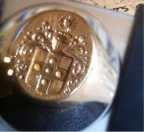for Peter Fuss
 hom·age (hŏmĭj, ŏm-)
hom·age (hŏmĭj, ŏm-)n.
1. Ceremonial acknowledgment by a vassal of allegiance to his lord under feudal law.
2. Special honor or respect shown or expressed publicly.
[Middle English, from Old French, probably from omne, homme, man, from Latin homō, homin-; see dhghem- in Indo-European roots.]
In the mid 1980s I went back to school at Missouri-St. Louis to study philosophy & art history. Peter Fuss was my first professor, in my first class. He took me under his wing and thus began a relationship that would have a profoundly positive impact on my life. My education to that point seemed more about what to think rather than how to think. He helped me through difficult passages and texts from Kant, Descartes, Arendt, Heidegger and through complex literature like Melville and Dante.
I will be 50 in a month and I once again have the pleasure of Pete’s company in a great reading group that gets together twice a month. It seems like a good chance to say, ‘thanks’ to dedicated teacher, philosopher and critic.



<< Home